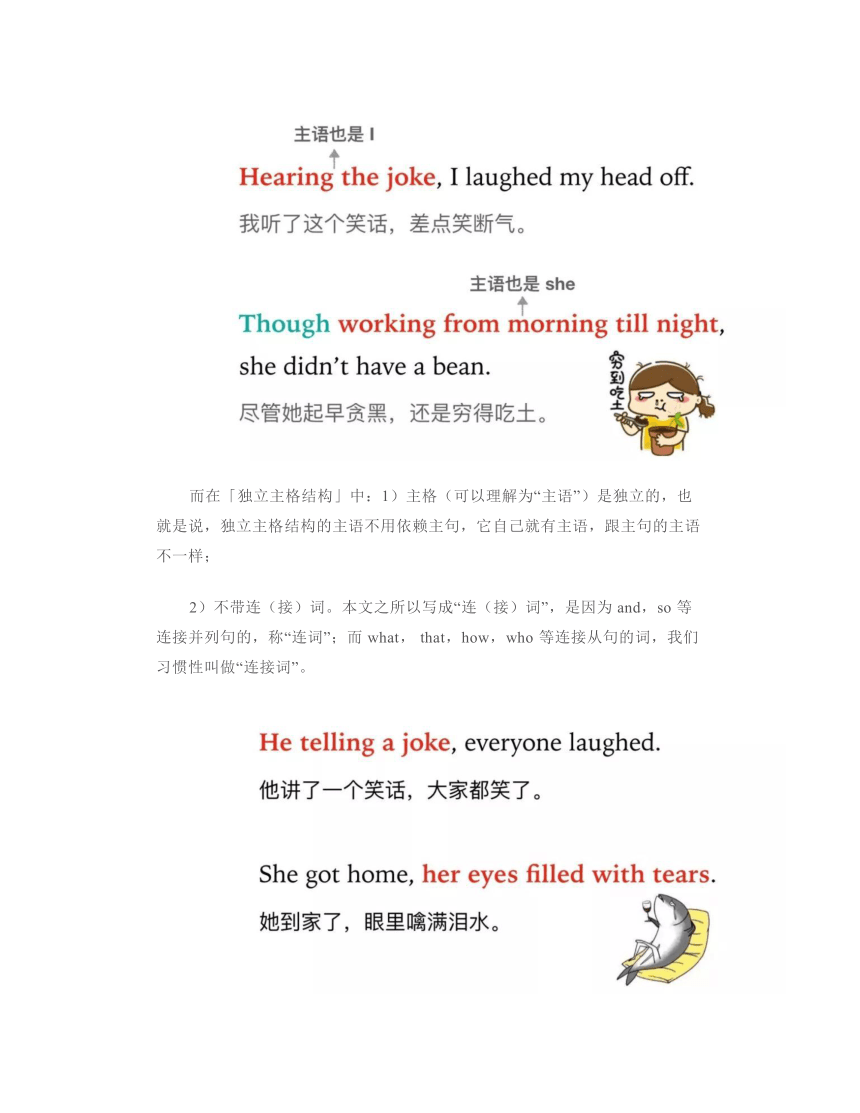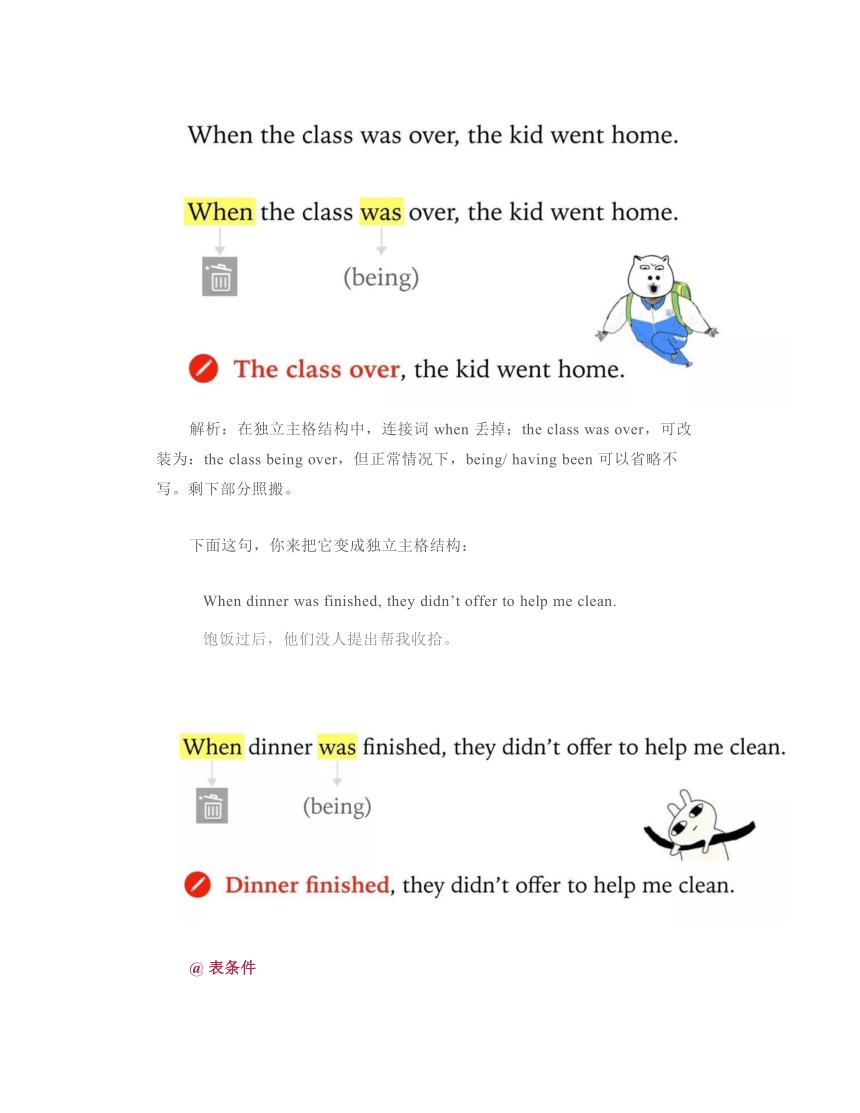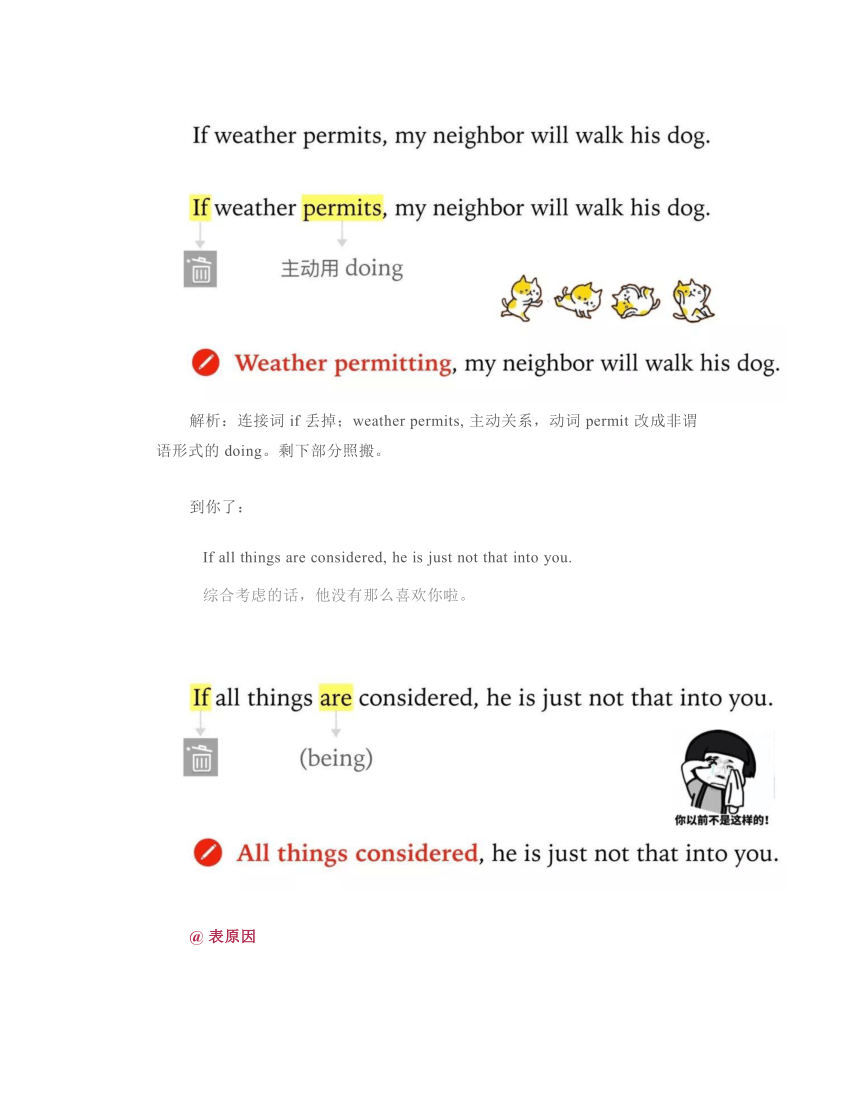2022届高考英语二轮复习:独立主格结构知识点归纳学案(含答案)
文档属性
| 名称 | 2022届高考英语二轮复习:独立主格结构知识点归纳学案(含答案) |  | |
| 格式 | doc | ||
| 文件大小 | 811.0KB | ||
| 资源类型 | 教案 | ||
| 版本资源 | 通用版 | ||
| 科目 | 英语 | ||
| 更新时间 | 2021-12-17 22:57:23 | ||
图片预览





文档简介
2022届高考英语语法综合复习讲义
独立主格结构知识点归纳练习
(含答案解析)
01.
主语独立、去连(接)词
「独立主格结构」与「分词作状语」的区别在于:
在上文中,我们刚讲到现在分词(doing)和过去分词(done)作状语,表示时间、原因、条件等。使用原则是:主、从句主语一致,并可以与when,if,though 等连接词连用。如:
而在「独立主格结构」中:1)主格(可以理解为“主语”)是独立的,也就是说,独立主格结构的主语不用依赖主句,它自己就有主语,跟主句的主语不一样;
2)不带连(接)词。本文之所以写成“连(接)词”,是因为 and,so 等连接并列句的,称“连词”;而 what, that,how,who 等连接从句的词,我们习惯性叫做“连接词”。
02.
四大功能
独立主格结构有4个常用的功能,分别是表时间、条件、原因,和伴随;我们用“十(时)条鹰(因)伴随”来记;接下来,本文将在每种功能下列出几个例句,请大家留心例句中独立主格的构成方式。
接下来,我们将分别对以上功能进行改装。此处有3个改装原则,请牢记:
1)对于独立主格结构的主语和动作,主动关系用 doing(现在分词)、被动关系用 done(过去分词)。有时候,一些固定搭配看起来像被动语态,实际上不含被动意义,如:be tired of, be filled with 等;
2)being,having been 一般省略,除了2种特殊情况,本文写在04 Part;
3)连(接)词统统扔掉。
@ 表时间
解析:在独立主格结构中,连接词 when 丢掉;the class was over,可改装为:the class being over,但正常情况下,being/ having been 可以省略不写。剩下部分照搬。
下面这句,你来把它变成独立主格结构:
When dinner was finished, they didn’t offer to help me clean.
饱饭过后,他们没人提出帮我收拾。
@ 表条件
解析:连接词 if 丢掉;weather permits, 主动关系,动词 permit 改成非谓语形式的 doing。剩下部分照搬。
到你了:
If all things are considered, he is just not that into you.
综合考虑的话,他没有那么喜欢你啦。
@ 表原因
注:独立主格结构中,如果出现否定,not 要提前;现在完成时形式的 have/ has done,改为 having done 即可:hasn’t released → not having released。此外,连词 because 丢掉。
到你:
Dad didn’t take his medicine, so Mom started chattering on about it.
老爸没有吃药,妈妈开启了叨逼叨模式。
注:didn’t take 只是简单的一般过去时,不涉及完成时,因此改装的时候不必小心翼翼,否定 not 提前,主动关系,后接 doing 即可。didn’t take → not taking。
@ 表伴随
注:wide 在本句中作副词,指“(睁得)很大”,修饰睁着眼这个动作:She opened her eyes wide → Her eyes were opened wide. 改装为独立主格结构,were 丢掉,只留下过去分词 opened,剩下照搬,即:her eyes opened wide.
你:
He read books, while his wife sewed by his side.
他看书,他老婆在旁边缝衣服。
03.
三大结构
以上,我们讲了独立主格结构“十条鹰伴随”的功能,在这部分,我们大致看看独立主格结构的三种结构:
本文认为,这三种结构大家都能记牢是最好的;如果实在记不全,想办法弄懂独立主格结构的改装规律(见 02 Part),有时间再多看看例句。
04.
特殊情况
1)在以下两种结构中,being,having been 不可以省略:
> > It be… 结构
It being Christmas, the stores are playing Jingle Bells.
It having been raining for days, I seem to have run out of dry panties.
> > There be… 结构
There being no taxi, we had to walk home.
2)一些固定搭配,本身是可以独立存在的分词短语,背下就对了:
> > to do
To make matters worse, the employees are banned from buying iPhones.
更糟的是,(企业)禁止员工购买苹果手机。
> > doing
Supposing the bride doesn’t show up, what shall we do
假如新娘不出现的话,我们咋办?
Considering that he is a kid, we won’t let him get away!
(考虑到)他还只是孩子,千万不要放过他!
05.
课后练习
1) ______ Sunday, I shall have a nice day at home.
A. There being B. It being C. It is
2) With a lot of difficult problems ______, the manager is having a hard time.
A. to settle B. settled C. to be settled
3) Everything ______ into consideration, they ought to be given another chance.
A. to take B. to be taken C. taken
4) The man stood under a tree, ______.
A. a pipe in mouth
B. with a pipe in mouth
C. pipe in mouth
5) The beggar stood there, ______ .
A. with back against the wall
B. with his back against the wall
C. his back was against the wall
6) The boy stood before the roasted duck, his eyes ______ on it and his mouth ______.
A. were fixed, was watered
B. fixed, watering
C. fixed, watered
7) ______, I had to do her work instead.
A. She was ill
B. Her being ill
C. She being ill
8) The lecture ______, he left his seat so quietly that no one complained that his leaving disturbed the speaker.
A. began B. beginning C. having begun
答案:
1-4)BACC 5-8)BBCC
整体解题思路
主动用 doing,被动用 done;
表示未做/ 将要做,用不定式 to do;
being/ having been 一般省略,除了It be.../ There be...结构;
with + sth. + 介词短语(完整版)= sth. + 介词短语(阉割版)
独立主格结构中,不用one's doing
1) ______ Sunday, I shall have a nice day at home.
A. There being B. It being C. It is
解析:原句应是:It is Sunday. 在改装的3大规则里,我们提到 being/ having been 一般可省,但是 It be... 结构不能省。所以 It is Sunday → It being Sunday.
2) With a lot of difficult problems ______, the manager is having a hard time.
A. to settle B. settled C. to be settled
解析:这题考察「主动表被动」,以及表示「将要做」用不定式。
首先,本题有“前方高能,经理将面临一堆待处理的难题”的意味,表示未做、将要做,用不定式 to do. 选项B直接排除。
其次,回忆一下,我们之前学过几种「主动表被动」的结构,最常见的有:
* There is nothing to do. 事情应该被(人)做,但在英文表达中,我们用这种主动形式表示被动含义。
* My room needs painting. 我的房间需要粉刷了,实际上是被人粉刷;但在这个表达中,我们看不到被动结构,这也是主动表被动的一种。
* with + sth. + to do 也是其中一种用法。这时我们不管事情是被做还是怎样,直接用动词原形 do 就可以了。因此,本题正解为:with a lot of difficult problems to settle.
3) Everything ______ into consideration, they ought to be given another chance.
A. to take B. to be taken C. taken
解析:这题跟我们在「独立主格结构」正文中出现的 "all things considered,..." (综合考虑,……)有异曲同工之处。改装公式如下,虫子演算一遍:
原句 we consider all things → 变被动 all things are considered → 变独立主格,being省略 all things considered。
接下来,虫子告诉你本题的原句是:we take everything into consideration,剩下两步看你的了:
→ 变被动 everything ???
→ 变独立主格 ???
4) The man stood under a tree, ______.
A. a pipe in mouth
B. with a pipe in mouth
C. pipe in mouth
解析:第4)和第 5)题是相同考点。此处出现一个新重点:with + 完整版sth. + 完整版介词短语 = 阉割版sth. + 阉割版介词短语。
阉割版怎么理解呢?就是把冠词(a,the等)和 形容词性物主代词(his,her等,表示“谁的”)切掉了。举个 :
with a book in his hand = book in hand
with a scarf on her head = scarf on head
with her back towards the door = back towards door
至于本题,要不就规规矩矩写 with a pipe in his mouth,冠词和代词都不能漏;要不就用阉割版 pipe in mouth。
5) The beggar stood there, ______ .
A. with back against the wall
B. with his back against the wall
C. his back was against the wall
解析:有人问“选项C没有问题啊,为什么不选它?”
咳咳,如果你选C,这在语法中叫做「杂糅句」,意思是大杂烩一样的句子,不懂利用连词、连接词,造成使用不规范。那么,怎样破「杂糅句」呢?
加连(接)词就行了。如果你非要选C,记得在前面加个 and → The beggar stood there, and his back was against the wall. 否则就乖乖用我们这节课学的「独立主格结构」:完整版 with his back against the wall(背靠在墙上),或者阉割版 back against wall。
6) The boy stood before the roasted duck, his eyes ______ on it and his mouth ______.
A. were fixed, was watered
B. fixed, watering
C. fixed, watered
解析:这题考固定搭配和词性。(eyes)be fixed on... 全神贯注地盯着。water 当动词用时,可指“流口水”,是不及物动词,(mouth)water.
开始改装,3大规则之一:being/ having been 一般情况下省略。所以本题可以这么改:原句 his eyes were fixed on it → 独立主格结构 his eyes fixed on it;原句 his mouth was watering → 独立主格结构 his mouth watering.
7) ______, I had to do her work instead.
A. She was ill
B. Her being ill
C. She being ill
解析:你是不是想选B?咳咳,独立主格结构很简单直接,不整his doing, her doing 这些的哦。主语只用主格形式,即 I,he,she,we,they 这些,本题用 she。
至于为什么不选A,详见第5)题有关「杂糅句」的解析。
8) The lecture ______, he left his seat so quietly that no one complained that his leaving disturbed the speaker.
A. began B. beginning C. having begun
解析:如果选A,句子就成了不规范的「杂糅句」;再看 B 和 C,C更能体现时间先后顺序:讲座已经开始了,他离开了座位(讲座是在他离开座位之前开始的,用过去完成时,had begun)
原句 the lecture had begun → 变独立主格结构 the lecture having begun.
独立主格结构知识点归纳练习
(含答案解析)
01.
主语独立、去连(接)词
「独立主格结构」与「分词作状语」的区别在于:
在上文中,我们刚讲到现在分词(doing)和过去分词(done)作状语,表示时间、原因、条件等。使用原则是:主、从句主语一致,并可以与when,if,though 等连接词连用。如:
而在「独立主格结构」中:1)主格(可以理解为“主语”)是独立的,也就是说,独立主格结构的主语不用依赖主句,它自己就有主语,跟主句的主语不一样;
2)不带连(接)词。本文之所以写成“连(接)词”,是因为 and,so 等连接并列句的,称“连词”;而 what, that,how,who 等连接从句的词,我们习惯性叫做“连接词”。
02.
四大功能
独立主格结构有4个常用的功能,分别是表时间、条件、原因,和伴随;我们用“十(时)条鹰(因)伴随”来记;接下来,本文将在每种功能下列出几个例句,请大家留心例句中独立主格的构成方式。
接下来,我们将分别对以上功能进行改装。此处有3个改装原则,请牢记:
1)对于独立主格结构的主语和动作,主动关系用 doing(现在分词)、被动关系用 done(过去分词)。有时候,一些固定搭配看起来像被动语态,实际上不含被动意义,如:be tired of, be filled with 等;
2)being,having been 一般省略,除了2种特殊情况,本文写在04 Part;
3)连(接)词统统扔掉。
@ 表时间
解析:在独立主格结构中,连接词 when 丢掉;the class was over,可改装为:the class being over,但正常情况下,being/ having been 可以省略不写。剩下部分照搬。
下面这句,你来把它变成独立主格结构:
When dinner was finished, they didn’t offer to help me clean.
饱饭过后,他们没人提出帮我收拾。
@ 表条件
解析:连接词 if 丢掉;weather permits, 主动关系,动词 permit 改成非谓语形式的 doing。剩下部分照搬。
到你了:
If all things are considered, he is just not that into you.
综合考虑的话,他没有那么喜欢你啦。
@ 表原因
注:独立主格结构中,如果出现否定,not 要提前;现在完成时形式的 have/ has done,改为 having done 即可:hasn’t released → not having released。此外,连词 because 丢掉。
到你:
Dad didn’t take his medicine, so Mom started chattering on about it.
老爸没有吃药,妈妈开启了叨逼叨模式。
注:didn’t take 只是简单的一般过去时,不涉及完成时,因此改装的时候不必小心翼翼,否定 not 提前,主动关系,后接 doing 即可。didn’t take → not taking。
@ 表伴随
注:wide 在本句中作副词,指“(睁得)很大”,修饰睁着眼这个动作:She opened her eyes wide → Her eyes were opened wide. 改装为独立主格结构,were 丢掉,只留下过去分词 opened,剩下照搬,即:her eyes opened wide.
你:
He read books, while his wife sewed by his side.
他看书,他老婆在旁边缝衣服。
03.
三大结构
以上,我们讲了独立主格结构“十条鹰伴随”的功能,在这部分,我们大致看看独立主格结构的三种结构:
本文认为,这三种结构大家都能记牢是最好的;如果实在记不全,想办法弄懂独立主格结构的改装规律(见 02 Part),有时间再多看看例句。
04.
特殊情况
1)在以下两种结构中,being,having been 不可以省略:
> > It be… 结构
It being Christmas, the stores are playing Jingle Bells.
It having been raining for days, I seem to have run out of dry panties.
> > There be… 结构
There being no taxi, we had to walk home.
2)一些固定搭配,本身是可以独立存在的分词短语,背下就对了:
> > to do
To make matters worse, the employees are banned from buying iPhones.
更糟的是,(企业)禁止员工购买苹果手机。
> > doing
Supposing the bride doesn’t show up, what shall we do
假如新娘不出现的话,我们咋办?
Considering that he is a kid, we won’t let him get away!
(考虑到)他还只是孩子,千万不要放过他!
05.
课后练习
1) ______ Sunday, I shall have a nice day at home.
A. There being B. It being C. It is
2) With a lot of difficult problems ______, the manager is having a hard time.
A. to settle B. settled C. to be settled
3) Everything ______ into consideration, they ought to be given another chance.
A. to take B. to be taken C. taken
4) The man stood under a tree, ______.
A. a pipe in mouth
B. with a pipe in mouth
C. pipe in mouth
5) The beggar stood there, ______ .
A. with back against the wall
B. with his back against the wall
C. his back was against the wall
6) The boy stood before the roasted duck, his eyes ______ on it and his mouth ______.
A. were fixed, was watered
B. fixed, watering
C. fixed, watered
7) ______, I had to do her work instead.
A. She was ill
B. Her being ill
C. She being ill
8) The lecture ______, he left his seat so quietly that no one complained that his leaving disturbed the speaker.
A. began B. beginning C. having begun
答案:
1-4)BACC 5-8)BBCC
整体解题思路
主动用 doing,被动用 done;
表示未做/ 将要做,用不定式 to do;
being/ having been 一般省略,除了It be.../ There be...结构;
with + sth. + 介词短语(完整版)= sth. + 介词短语(阉割版)
独立主格结构中,不用one's doing
1) ______ Sunday, I shall have a nice day at home.
A. There being B. It being C. It is
解析:原句应是:It is Sunday. 在改装的3大规则里,我们提到 being/ having been 一般可省,但是 It be... 结构不能省。所以 It is Sunday → It being Sunday.
2) With a lot of difficult problems ______, the manager is having a hard time.
A. to settle B. settled C. to be settled
解析:这题考察「主动表被动」,以及表示「将要做」用不定式。
首先,本题有“前方高能,经理将面临一堆待处理的难题”的意味,表示未做、将要做,用不定式 to do. 选项B直接排除。
其次,回忆一下,我们之前学过几种「主动表被动」的结构,最常见的有:
* There is nothing to do. 事情应该被(人)做,但在英文表达中,我们用这种主动形式表示被动含义。
* My room needs painting. 我的房间需要粉刷了,实际上是被人粉刷;但在这个表达中,我们看不到被动结构,这也是主动表被动的一种。
* with + sth. + to do 也是其中一种用法。这时我们不管事情是被做还是怎样,直接用动词原形 do 就可以了。因此,本题正解为:with a lot of difficult problems to settle.
3) Everything ______ into consideration, they ought to be given another chance.
A. to take B. to be taken C. taken
解析:这题跟我们在「独立主格结构」正文中出现的 "all things considered,..." (综合考虑,……)有异曲同工之处。改装公式如下,虫子演算一遍:
原句 we consider all things → 变被动 all things are considered → 变独立主格,being省略 all things considered。
接下来,虫子告诉你本题的原句是:we take everything into consideration,剩下两步看你的了:
→ 变被动 everything ???
→ 变独立主格 ???
4) The man stood under a tree, ______.
A. a pipe in mouth
B. with a pipe in mouth
C. pipe in mouth
解析:第4)和第 5)题是相同考点。此处出现一个新重点:with + 完整版sth. + 完整版介词短语 = 阉割版sth. + 阉割版介词短语。
阉割版怎么理解呢?就是把冠词(a,the等)和 形容词性物主代词(his,her等,表示“谁的”)切掉了。举个 :
with a book in his hand = book in hand
with a scarf on her head = scarf on head
with her back towards the door = back towards door
至于本题,要不就规规矩矩写 with a pipe in his mouth,冠词和代词都不能漏;要不就用阉割版 pipe in mouth。
5) The beggar stood there, ______ .
A. with back against the wall
B. with his back against the wall
C. his back was against the wall
解析:有人问“选项C没有问题啊,为什么不选它?”
咳咳,如果你选C,这在语法中叫做「杂糅句」,意思是大杂烩一样的句子,不懂利用连词、连接词,造成使用不规范。那么,怎样破「杂糅句」呢?
加连(接)词就行了。如果你非要选C,记得在前面加个 and → The beggar stood there, and his back was against the wall. 否则就乖乖用我们这节课学的「独立主格结构」:完整版 with his back against the wall(背靠在墙上),或者阉割版 back against wall。
6) The boy stood before the roasted duck, his eyes ______ on it and his mouth ______.
A. were fixed, was watered
B. fixed, watering
C. fixed, watered
解析:这题考固定搭配和词性。(eyes)be fixed on... 全神贯注地盯着。water 当动词用时,可指“流口水”,是不及物动词,(mouth)water.
开始改装,3大规则之一:being/ having been 一般情况下省略。所以本题可以这么改:原句 his eyes were fixed on it → 独立主格结构 his eyes fixed on it;原句 his mouth was watering → 独立主格结构 his mouth watering.
7) ______, I had to do her work instead.
A. She was ill
B. Her being ill
C. She being ill
解析:你是不是想选B?咳咳,独立主格结构很简单直接,不整his doing, her doing 这些的哦。主语只用主格形式,即 I,he,she,we,they 这些,本题用 she。
至于为什么不选A,详见第5)题有关「杂糅句」的解析。
8) The lecture ______, he left his seat so quietly that no one complained that his leaving disturbed the speaker.
A. began B. beginning C. having begun
解析:如果选A,句子就成了不规范的「杂糅句」;再看 B 和 C,C更能体现时间先后顺序:讲座已经开始了,他离开了座位(讲座是在他离开座位之前开始的,用过去完成时,had begun)
原句 the lecture had begun → 变独立主格结构 the lecture having begun.
